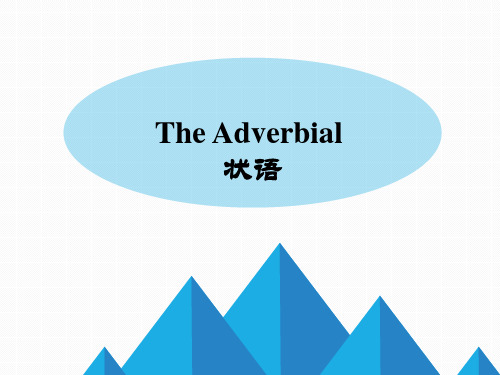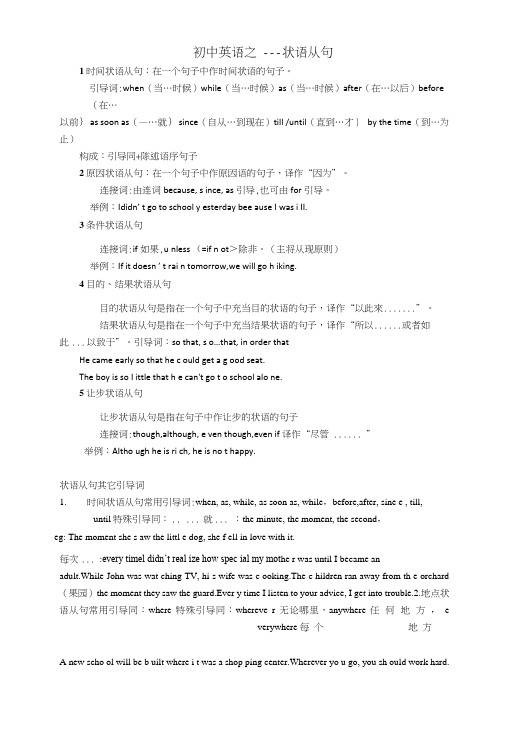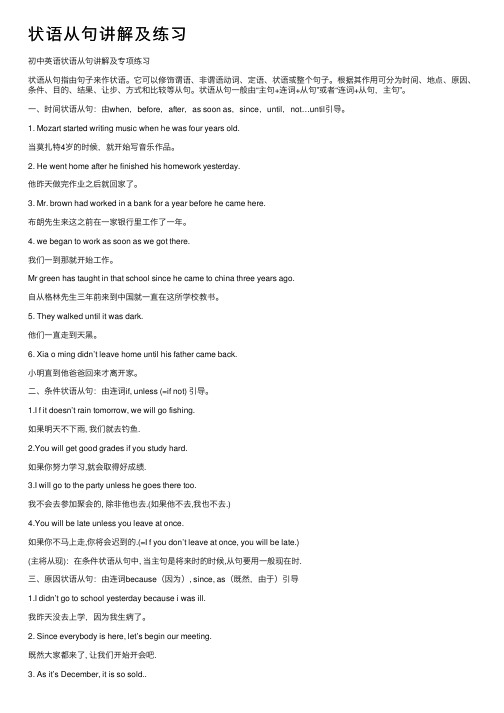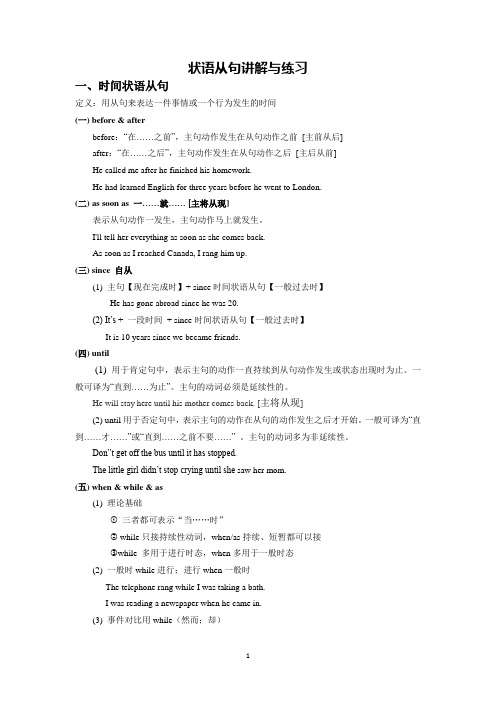状语从句用法讲解和练习
状语及状语从句(语法加练习完整讲解)

结果状语从句
The problem is so difficult that it will take us time to work it out. 这道题如此难以至于我们要用很多时间才能解决。
She is such a kind girl that everyone likes her. 她非常善良,以至于每个人都喜欢她。
not that...but that...(不是因为...而是因为)
条件状语从句
If you want to succeed, you'd better work hard. 如果你想成功,最好努力工作。 I'll come unless it rains. 除非下雨,否则我一定来。 You can borrow the book as long as you promise to keep i Ming studied so hard that he caught up with the others very quickly. 李明学习如此努力,结果很快赶上了其他人。
6.程度状语: I nearly forgot what he had promised. 我几乎忘记了他答应的事。
(2)如果动词前有一个或几个助动词,状语位于第一个 助动词之后。 He has already had his lunch.他已吃过午饭了。
(3)如果动词是be,状语就放在be动词之后。 He is always at home. 他总是在家。
3.状语位于句末,这是状语的通常位置。
We get up at six in the morning. 我们早晨六点起床。
三、状语的分类:
状语按用途可分为:地点、时间、原因、目的、 结果、条件、让步、程度、方式、伴随情况等几类。
高中英语状语从句讲解与练习

高中英语状语从句讲解与练习高中英语状语从句一、时间状语从句1、when的用法(1)when既可引导一个持续性动作,也可引导一个短暂性动作,可用于表示主句和从句动作同时发生或从句动作先于主句动作,有时还可表示从句动作后于主句,意为“当……时候”。
(2)when在beabouttodo……when……,bedoing……when……,haddone……when……,beonone’sway……when……,beonthepointofdoing…when……等结构中作“那时突然”讲。
(3)when“既然、鉴于;尽管,虽然(位于主句之后);如果”2、while的用法(1)则表示“当……时候”,鼓励的动作必须就是延续性的。
(2)用做同列连词,则表示相对关系“然而”。
(3)引导让步状语从句,相当于although,意为“虽然”,位于主句前。
(4)引导条件状语从句,相当于as/solongas,意为“只要”。
3、as的用法(1)则表示“当……时候”,特别强调同时出现,不所指先后。
(2)说明两种正在发展或变化的情况,表示“随着”,表示时间的推移。
(3)表示“一边……一边……”(4)强调两个动作紧接着发生。
(5)表示“虽然,尽管”(6)其他含义“正像,正如”,“做为”,“由于,因为”。
4、before的用法(1)一般意为“在……之前”“……才”,“……就”“还没有……”“免得”“不知不觉”“宁可,宁愿”,“否则,要不然”。
(2)itwillbe/was时间段before通常现在时/通常过去时。
在肯定句中,意为“多长时间之后才”;在否定句中,意为“用没法多长时间就”。
5、until和till(1)与肯定句连用,必须是延续性动词。
(2)与否定句属格,必须不为延续性动词,则表示“直至……才,在……之前不……”。
特别注意:notuntil可以用作特别强调句和倒装句强调句:itis/wasnotuntil…that…倒装句:notuntil放句首时,主句要部分倒装。
根据英语时间状语从句讲解及练习(简化版)

根据英语时间状语从句讲解及练习(简化版)一、什么是时间状语从句时间状语从句是由连词引导的从句,用来表示一个动作或状态发生的时间,它可以在句子中充当状语,起到修饰或限定其他句子成分的作用。
二、几种常见的时间状语从句及用法1. when当...时候例句:He was studying in the library when the earthquake happened.译文:地震发生时,他正在图书馆研究。
2. while当...的同时例句:I was cleaning the house while my sister was cooking.译文:我正在打扫房子,而我妹妹正在做饭。
3. as soon as一...就...例句:She called me as soon as she arrived home.译文:她一到家就给我打电话。
4. before在...之前例句:Please finish your homework before you go out to play. 译文:在你出去玩之前,请完成你的家庭作业。
5. after在...之后例句:He went to bed after he watched the movie.译文:他在看完电影之后上床睡觉。
6. until直到...例句:They played basketball until it got dark.译文:直到天黑之前他们都在打篮球。
三、时间状语从句练1. _______ he finishes his work, he will join us for dinner. (when)译文:当他完成工作时,他会加入我们共进晚餐。
2. I fell asleep _______ I was reading a book. (while)译文:我边看书边睡着了。
3. We will go shopping _______ the rain stops. (as soon as)译文:一雨停,我们会去购物。
初中英语状语从句讲解及练习.doc

初中英语之 --- 状语从句1时间状语从句:在一个句子中作时间状语的句子。
引导词:when(当…时候)while(当…时候)as(当…时候)after(在…以后)before(在…以前} as soon as(—…就} since(自从…到现在)till /until(直到…才}by the time(到…为止)构成:引导同+陈述语序句子2原因状语从句:在一个句子中作原因语的句子,译作“因为”。
连接词:由连词because, s ince, as引导,也可由for引导。
举例:Ididn’ t go to school y esterday bee ause I was i II.3条件状语从句连接词:if如果,u nless (=if n ot>除非。
(主将从现原则)举例:If it doesn ’ t rai n tomorrow,we will go h iking.4目的、结果状语从句目的状语从句是指在一个句子中充当目的状语的句子,译作“以此來.......”。
结果状语从句是指在一个句子中充当结果状语的句子,译作“所以......或者如此... 以致于”。
引导词:so that, s o…that, in order thatHe came early so that he c ould get a g ood seat.The boy is so I ittle that h e can't go t o school alo ne.5让步状语从句让步状语从句是指在句子中作让步的状语的句子连接词:though,although, e ven though,even if 译作“尽管 ...... ”举例:Altho ugh he is ri ch, he is no t happy.状语从句其它引导词1.时间状语从句常用引导词:when, as, while, as soon as, while,before,after, sine e , till,until 特殊引导同:.. ... 就... :the minute, the moment, the second,eg: The moment she s aw the littl e dog, she f ell in love with it.每次... :every timel didn’t real ize how spec ial my mot he r was until I became anadult.While John was wat ching TV, hi s wife was c ooking.The c hildren ran away from th e orchard (果园)the moment they saw the guard.Ever y time I listen to your advice, I get into trouble.2.地点状语从句常用引导同:where特殊引导同:whereve r无论哪里,anywhere 任何地方,everywhere 每个地方A new scho ol will be b uilt where i t was a shop ping center.Wherever yo u go, you sh ould work hard.状语从句练习单项选择1.John does n't letever ybodyinthe kitchen __________ h e could makehis sur prisedinner fortheparty.A. which B. when C. so that D. as if 2.I wouldt hankit __________ you call back this a fternoon for the doctor5 smeeting.A.until B. if C. when D. that3.Asfar as Iam concerned (就我而言),education is about learning and the more you learn,—____ A. the betterlife will you get B. the betterlife you will ge tC. you will get the bet ter lifeD.will you get the bet ter life4.Af ter the war, a new school wasbuilt _____________ t here had once be en(曾经有)a theatre.A. that B. where C . which D. whe n5.—Is Mr.Smith in the office?—Yes , __________ he is in charg e of the office, he mustbe there.A.since B. how ever C. whether D. for 6.As your good friendJ will do ____________help you.A. that I can to B. what I canto C. all that I can D. what I can7.Someone called me up in the middle ofthe night, b ut they hung up(挂断电话)____________ I coul d answer the phone.A.as B.since C. until D. before8.We must hurry up __________catchup with the last train.A. that B. so that to C. in order that D. in ord er toLondon 9.No m atter ________ h ard it ma y be, I will carry it out .A. what B. whatev er C.how D. however 1 0. _________you may do, you must do itwell.A. Which B.Whenever C. What ever D.WhenM. ________ you are so weak, you’d better sta y at home.A.Since B. For C. B ecause D. Though 1 5.1saw Mr.Smith last S unday. We had not seen each other ____________ I left .A. as B. before C.since D. till 16.1’11 be back before you ________ .A.will leave B will have left C.leave D. would lea vel7.If the weather ____________ tomor row, we will go picnic i n the centra 1 park.A wil 1 be fine Bis fine Cis going to be fine D h ave been fine18. ________________________ They wen t on working it was late at night.A. eve n if B.as if C. however D. as tho ughl9.l hurr ied _____________ I wouldn't b e late for c lass.A. sine e B. sotha t C.as if D . unless20.T he volleybal I match will be put off if it __________ .A. will r ain B. rain s C. r ained D. is raining【实例解析】1.(2004年北京市海淀区中考试题)You will sta y healthy ________ you do more exerci se, such as running and walking.A.ifB. howC. beforeD. where2.(2004年江丙省中考试题)…Shall we go on wor king?Ye s, _________ I prefer to have a rest.A. whenB. ifC. be causeD. th ough3.(2004年徐州市中考试题)N one of us kn ew what had happened ___________ they told us abo ut it.A. w henB. unti IC. afterD. though4.(2004年泉州市中考试题)••-1 ho pe you’ll en joy your tri p, dear!—Thank you,mum. Til gi ve you a cal I ___________ I get there.A. untilB. as soon a sC. sinceD. till【中考演练】一.单项填空1. ______ he z s old, he c an still car ry this heav y bag.A. T houghB. Si neeC. ForD. So2.•■-Do you know if he ______ to play ba sket ball wi th us?---1 think he wi II come if h e _______ fre e tomorrow.A. comes; i sB. comes;will beC.will come;isD. will come; will b e3.In the z oo if a chil d _____ into the water a nd can't swi m, the dolph ins may come up _________ him.A. will fall; to he IpB. fall s; to helpC. will fall; help D . falls; hel ping4.1don z t remember _________ he worked in th at city when he was youn g.A. whatB. which C . where D.who5.We wil I stay at ho me if my aunt __________ to visit us t omorrow.esB. c omeC. will comeD. is coming6.Th e police ask ed the child ren _______ cross the st reet _________ the traffi c lights tur ned green.A. not; befo reB. don't; whenC. n ot to; untilD. not; af ter7.1was late for cla ss yesterday ________ t he re was somet hing wrong w ith my bike.A. when B . that C. u ntil D. bee ause8.I’ll go swimming with you if I _________ f ree tomorrow .A. will b eB. shall beC. am D . was9.In t he exam, the ________ yo u are, _______ the ________ mistakes y ou will make .A. carefu I; littleB. more ca reful; fewes tC. more c areful; fewe rD. more c a ref u I; less10.You shou Id finish yo ur lessons _______ you g o out to pal y.A. beforeB. afterC. whenD.while11.1hurried _____ I wouldn't be late for class.A.sinceB. s o thatC. a s ifD. uni ess12.When you read the book, you'd better make a mark ________ you have any questio ns.A. whi chB. thatC. where D . though13.The teacher raised his v oice ________ a ll the stu dents could hear him.A. forB. s o thatC. b ecauseD. i n order14.H e took off h is coat ________ h e felt hot.A. be causeB. asC. ifD.since15.It is ______ th at we'd like to go out f or a walk.A. a lovely dayB. t oo lovely a dayC. so lovely a dayD. such Io vely a day16 . Mary had _______ m uch w ork to do th at she staye d at her off ice all day.A. suchB.soC. tooD. very17.______ I fel t very tired , I tried to finish the work.A. AlthoughB.BecauseC.AsD. As if18.______ t he day went on, the weat her got wors e.A. WithB. SinceC. WhileD.As19.______ well you c an drive, yo u must drive carefully.A. So long asB.ln order tha tC. No ma tter how D . The momentBeijing20. Write to me as soon as you _________ to.A . will get B. get C. g etting D. g ot二.根据中文意思完成下列英语句子1.不管他跟我开什麽玩笑,我都不生气。
状语从句讲解及练习

状语从句讲解及练习初中英语状语从句讲解及专项练习状语从句指由句⼦来作状语。
它可以修饰谓语、⾮谓语动词、定语、状语或整个句⼦。
根据其作⽤可分为时间、地点、原因、条件、⽬的、结果、让步、⽅式和⽐较等从句。
状语从句⼀般由“主句+连词+从句”或者“连词+从句,主句”。
⼀、时间状语从句:由when,before,after,as soon as,since,until,not…until引导。
1. Mozart started writing music when he was four years old.当莫扎特4岁的时候,就开始写⾳乐作品。
2. He went home after he finished his homework yesterday.他昨天做完作业之后就回家了。
3. Mr. brown had worked in a bank for a year before he came here.布朗先⽣来这之前在⼀家银⾏⾥⼯作了⼀年。
4. we began to work as soon as we got there.我们⼀到那就开始⼯作。
Mr green has taught in that school since he came to china three years ago.⾃从格林先⽣三年前来到中国就⼀直在这所学校教书。
5. They walked until it was dark.他们⼀直⾛到天⿊。
6. Xia o ming didn’t leave home until his father came back.⼩明直到他爸爸回来才离开家。
⼆、条件状语从句:由连词if, unless (=if not) 引导。
1.I f it doesn’t rain tomorrow, we will go fishing.如果明天不下⾬, 我们就去钓鱼.2.You will get good grades if you study hard.如果你努⼒学习,就会取得好成绩.3.I will go to the party unless he goes there too.我不会去参加聚会的, 除⾮他也去.(如果他不去,我也不去.)4.You will be late unless you leave at once.如果你不马上⾛,你将会迟到的.(=I f you don’t leave at once, you will be late.)(主将从现):在条件状语从句中, 当主句是将来时的时候,从句要⽤⼀般现在时.三、原因状语从句:由连词because(因为), since, as(既然,由于)引导1.I didn’t go to school yesterday because i was ill.我昨天没去上学,因为我⽣病了。
初中状语从句全面讲解练习题及答案

初中状语从句全面讲解练习题及答案1、基本含义状语修饰动词、形容词、副词或整个句子。
通常由副词、介词短语、动词不定式、分词和从句等担当。
请用下划线划出下列句子中的状语,并说明是什么在做状语:He speaks English very well.He is playing under the tree.I come specially to see you.The boy was praised for his bravery.When she was 12 years old, she began to live in Dalian.If I am not busy tomorrow, I will play football with you.什么是状语从句?用来修饰主句中的动词,副词和形容词的从句叫状语从句。
根据其含义状语从句可分为时间状语从句,地点状语从句,条件状语从句,原因状语从句,结果状语从句,比较状语从句,目的状语从句,让步状语从句。
例句:I will call you as soon as I arrive in Beijing.If he comes back, please let me know.I know how to light a camp fire because I had done it before.2、用法归纳1. 时间状语从句(1)时间状语从句常用when, as, while, before, after, since, till, until, as soon as等连词来引导。
例如:It was raining hard when we got to school yesterday.While he was doing his homework, the telephone rang.As he walked along the lake, he sang happily.He had learned a little Chinese before he came to China.After he finished middle school, he went to work in a factory.(2)在时间状语从句里,通常不用将来时态,用现在时态表示将来的动作或状态。
状语从句讲解与练习

状语从句讲解与练习一、时间状语从句定义:用从句来表达一件事情或一个行为发生的时间(一) before & afterbefore:“在……之前”,主句动作发生在从句动作之前[主前从后]after:“在……之后”,主句动作发生在从句动作之后[主后从前]He called me after he finished his homework.He had learned English for three years before he went to London.(二)as soon as 一……就…… [主将从现]表示从句动作一发生,主句动作马上就发生。
I'll tell her everything as soon as she comes back.As soon as I reached Canada, I rang him up.(三) since 自从(1) 主句【现在完成时】+ since时间状语从句【一般过去时】He has gone abroad since he was 20.(2) It’s + 一段时间+ since时间状语从句【一般过去时】It is 10 years since we became friends.(四) until(1) 用于肯定句中,表示主句的动作一直持续到从句动作发生或状态出现时为止。
一般可译为“直到……为止”。
主句的动词必须是延续性的。
He will stay here until his mother comes back. [主将从现](2) until用于否定句中,表示主句的动作在从句的动作发生之后才开始。
一般可译为“直到……才……”或“直到……之前不要……” 。
主句的动词多为非延续性。
Don”t get off the bus until it has stopped.The little girl didn’t stop crying until she saw her mom.(五) when & while & as(1) 理论基础①三者都可表示“当……时”② while只接持续性动词,when/as持续、短暂都可以接③while 多用于进行时态,when多用于一般时态(2) 一般时while进行;进行when一般时The telephone rang while I was taking a bath.I was reading a newspaper when he came in.(3) 事件对比用while(然而;却)Father was preparing a report while I was playing PC games.He likes coffee while she likes tea.(4) “随着”/“一边…一边”用asThings are getting better and better as time goes on.She sang as she went along.二、原因状语从句because 因为(不与so连用)(1) because &because ofbecause引导原因状语从句because of 是介词短语,后跟n./pron./V-ing,句中作原因状语-- Why didn't he come here?-- He didn’t come here because he was ill.-- He didn’t come here because of his illness.(2) because & for & since & asbecause 语气最强烈;for放句中,用来表示一种附带或补充解释、说明;since & as 通常放句首,作“既然”讲。
状语从句课件讲解和练习

2 on / upon doing / on upon one’s +n
On arriving at the station, the thief was arrested. On his arrival in Paris, he was recognized as a famous person.
1 as 引导的让步从句要倒装,句型为: 形容词/ 副词/ 名词 不带冠词 / 动词 原形 +主语+谓语 Young as he is, he knows a lot. Much as I like it, I can’t afford it. Farmer as he is, he is well-educated. Try as I might, I couldn’t lift the stone. 2 although不倒装, though可倒装也可不 倒装, as 必须倒装
We didn’t go home _____ we finished the work. A. since B. until C. because D. though
It was not ______ she took off her dark glasses ______ I realized she was a famous film star. A. when; that B. until; that C. until; when D. when; then
另外, when/while还作并列连词,连接并列分句, while表示 “而,可是”如: I like reading while my wife enjoys watching TV. when表示 “就在这时” 在下列结构中,表示某 件事正在发生或刚刚发生,另一动作同时发生。
- 1、下载文档前请自行甄别文档内容的完整性,平台不提供额外的编辑、内容补充、找答案等附加服务。
- 2、"仅部分预览"的文档,不可在线预览部分如存在完整性等问题,可反馈申请退款(可完整预览的文档不适用该条件!)。
- 3、如文档侵犯您的权益,请联系客服反馈,我们会尽快为您处理(人工客服工作时间:9:00-18:30)。
状语从句用法讲解和练习Document number:NOCG-YUNOO-BUYTT-UU986-1986UT第章状语从句学习指导状语从句在句子中作状语,用来修饰主句或主句的谓语。
一般可分为九大类,分别表示时间、地点、原因、目的、结果、条件、让步、比较和方式。
尽管种类较多,但由于状语从句与汉语结构和用法相似,所以理解和掌握它并不难。
状语从句的关键是要掌握引导不同状语从句的常用连接词。
现分别列举如下:第一节时间状语从句when强调“特定时间”,表示主句谓语动词的动作与从句谓语动词的动作是同时发生的,或从句的动作发生在主句的动作之前;while表示的时间是一段,而不是一点,as 多用在口语中,强调“同一时间”或“一前一后”,有时还有“随着”的含义。
I'll go on with the work when/come back tomorrow.我明天回来后会继续做我的工作。
When spring came, he felt like a trip.春天来了,他想去旅游。
As spring warms the good earth,all flowers begin to bloom.(as有“随着”的含义)as, when, while都表示主、从句的动作或状态同时发生,但三者也有区别。
as和when引导的从句既可表示一点时间,也可表示一段时间,从句中的谓语动词既可以是持续性动词,也可以为短暂性动词,经常可以互换使用;while引导的从句通常表示一段时间,从句中宜用持续性动词作谓语。
当从句中的谓语动词为持续性动词时,这三者可以通用(前面例句中已有体现),再如:Mother was worried because little Alice was ill, especially as / when / while father was away in France.妈妈担心,因为小艾丽思病了,特别是当父亲远在法国的时候。
如果从句和主句要表示一个人的两个动作交替进行或同时完成时,则多用as,可译为“一边......,一边......”。
例如:He looked behind from to time as he went.他一边走,一边不时地往后看。
As time goes on, it’s getting warmer and warmer..随着时间的推移,天气变得越来越暖了。
I thought of it just as you opened your mouth.你一张嘴我就知道你要说什么。
(若表示两个短促动作几乎同时发生时,用as的场合多于when.)当主从句之间表示转折或对比关系时,多用while, 不用as或when。
如:She thought I was talking about her daughter, while in fact, I was talking about my daughter.她以为我在谈论她女儿,而事实上,我在谈论我的女儿。
如果表示从句的动作在主句的动作“之前”或“之后”发生时,多用when(=after), 不用as 或 while。
此外,when还含有“at that moment”的意思(= and then),引起的句子不能放在句首,也不能用as, while来替换。
例如:He was about to leave when the telephone rang.他正要离开,忽然电话铃响了。
We were watching TV when suddenly the lights went out.我们正在看电视,突然灯灭了。
They had just arrived home when it began to rain.他们刚到家,天就开始下雨了。
3.till/until,表示“一直到……”,主从句都用肯定式;表示“直到……才”,主句否定,从句肯定。
He worked until it was dark. 他一直工作到天黑。
He did not get up till his mother came in. 一直到母亲进来他才起床。
4.once“一旦”,by the time“到……时”。
Once you see her, you will find what I said is true. 一旦你见到她就会发现我说的是对的。
by the time+现在时,主句用将来完成时。
By the time he arrives, we will already have left here. 等他到达时,我们将已离开这儿了。
by the time+一般过去时,主句用过去完成时。
By the time he arrived, we had already left here.他到达的时候我们早已离开这儿了。
5.as soon as,the moment表示从句动作一发生,主句动作随即发生,通常译为“一……就”。
As soon as I finish the work, I'll go to see you. 我一完成工作就会来看你。
She came to the scene the moment she heard the news.她一听到消息就来到现场。
6.since“自从”,before“在……前”,after“在……后”,It was not long before意为“不久”。
since引导从句用非延续性动词或“过去时间点”或“过去时间段+ago”,主句用完成时态。
Since he graduated, he has worked in this city. 他毕业后一直在这个城市工作。
I haven't seen him since last year/ three years ago. 去年以来/3年来,我没见过他。
选出最佳答案1) ___________ he was listening to the music, John fell asleep.A. AfterB. BeforeC. WhileD. As soon as-2) How did you try to get to school on time _______ y ou missed the school bus.A. whenB. howC. whyD. that3) He was riding to school _________ he was hit by a car this morning.A while B. when C. as D. so4) Lucy knew nothing about it _________ her sister told her.A. becauseB. untilC. ifD. since5) The policeman asked the child ________ cross the street __________ the trafficlights turned green.A. not; whenB. don't; beforeC. not to; untilD. not to; since6) The book was so interesting that he had read it for three hours he realized it.A. whenB. afterC. untilD. before7) ____________ w e had seen all the animals, we went home.A. ThenB. AfterC. ThoughD. While8) She has made many friends _________ she came to our school.A. beforeB. afterC. sinceD. until9) — How long has the weather been like thisA. Until last nightB. Ever since last nightC. Two days agoD. Two days later10) My uncle went to Australia last year. We haven't seen him .A. since almost a yearB. from almost a year onC. after almost a yearD. since almost a year ago11) He was so tired that he fell asleep _________ he went to bed.A. as ifB. even thoughC. ever sinceD. as soon as12) I knew nothing about the accident _________ my friend told me yesterday.A. becauseB. sinceC. untilD. after13) I didn't manage to do it _________ you had explained how.A. untilB. sinceC. whileD. after 【Keys】1) C 2) A 3) B 4) B 5) A 6) D 7)B 8) C 9) B 10) D 11) D 12) C 13) A第二节条件状语从句If you don't look after young trees, they will die very quickly.If the museum charges for entry, a lot of people won't be able to visit it.3.表示否定的条件用unless( =if...not)“除非,如果不”。
I shall not go to the cinema unless I finish my homework before eight.说明:i f…not常可以用unless替代。
If you don’t study hard, you will fail in the exam.You will fail in the exam unless you study hard.4.表示使某事成为现实必要的条件用on condition that“条件是”,as long as ‘‘只要”。
